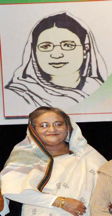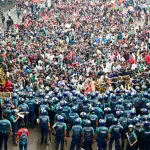Subscribe to ShahidulNews
![]()
By Rahnuma Ahmed

Honouring Begum Rokeya, the prime minister Sheikh Hasina at Begum Rokeya Padak 2010 programme, Osmani Memorial Auditorium, Dhaka, December 9 2010. Photo: Yasin Kabir joy/focusbangla. crop: Mir Ashfaquzzaman
Prime minister Sheikh Hasina, currently the most powerful woman in Bangladesh?recently rated the sixth most powerful woman in Asia, included in Forbes’ annual list of the politically most powerful hundred women in the world ? while awarding the prestigious Rokeya Padak 2010, to give public recognition to women who have made outstanding contributions in securing women’s rights, spoke with a `man’ tongue.
In other words, she blamed women. It was vintage patriarchy, albeit, suitably modified to a modern-day context.
While prime ministerial speeches on such occasions are generally devoted to self-congratulatory rhetoric and platitudes, Sheikh Hasina’s speech seems to have been different. I glean this from news reports.
She spoke at length about stalking and other forms of sexual harassment which have escalated to outrageous levels over the last year. Which target girls and young women, in particular. Students in particular, girls who are studying in the nation’s schools, colleges, universities and madrasas.
But given the figures released by women and human rights organisations on the International Day against the Elimination of Violence against Women (November 25), notably the worst in 3 years, further, the numbers reported in each category are higher than that for the whole of last year,
489 women were raped
53 women and 23 girls were killed, after being raped
4 girls committed suicide, after being raped
71 had acid thrown on them
342 were subjected to dowry-related violence
210 women and 7 girls were killed
102 women were tortured
21 women committed suicide, after being tortured
given that these figures have since increased, what could be more shocking for women?and for men too, since 9 have been killed while trying to protect girls against stalking and assaults?than to listen to the PM exhort girls and women to “face” stalkers bravely. To “show courage.” Why “choose” suicide, something as extreme as that? There is “no reason,” she said. Learn self-defence instead. Wear “modest” clothes. The last piece of advice was delivered with a personal touch, “I never encountered any obstacles.” Guardians, she stressed, should teach their children religious morals and cultural values.
The prime minister, I hasten to add, spoke of other things as well. Of policies and programmes undertaken by her government which benefit women: extending maternity leave to six months. Making it easier for a widowed woman to gain access to her husband’s pension. Initiating the payment of pensions to widower-husbands married to government employees, so as not to discriminate against men. Promising to reactivate the Women Development Policy, a central demand of the women’s movement for many years.
On the face of it, there’s nothing wrong with some of her messages. Urging girls not to be frightened. Not to think of themselves as victims. To fight back and resist. To remind us that rights must be struggled for, that they are never served on a silver platter. That enacting laws is never enough. That public awareness is needed.
Of course, public awareness is needed. What Nashfia Akhand Pinky?a 13 year-old student of class IX who was incessantly stalked by her 22 year-old male neighbor and some of his friends, who persisted with “ribald comments, smutty jokes, coarse laughter, sly whistles and even indecent exposure”?wrote in her suicide note is a severe indictment of those members of the public who were present but had not lifted a finger, “When [my tormentor] pulled my scarf and harassed me physically in front of the house [when he slapped me], onlookers at the scene laughed. Nobody protested” (BBC News).
But manonio prime minister, when girls (and their families) do “show courage,” do not “choose” suicide, “face” the situation bravely, what can, and has, happened? Ten Bangladesh Chatra League (BCL) activists of a group of sixteen, allegedly gang-raped a class VII student in Pakhimara (Patuakhali) in September last year. Her relatives rushed to the scene with police officials, two of the culprits were arrested from the scene of the crime. What happened next? Were the rest of the offenders arrested? Was the case investigated? Were they tried? No. The two caught were freed, a farcical village arbitration attended by local-level Awami League influentials was held, all 16 were fined Tk 10,000 each and 100 whippings. The AL upazila Unit secretary denied allegations of rape, dubbing them (mere) “spoiled brats.” He asked the girl and her father to affix their signature to 3 blank sheets of paper, he told them to not seek justice elsewhere. The victim’s father `chose’ not to file a case, the police didn’t proceed any further.
Did high level Awami League leaders `show courage’ by taking up the matter? Did the party institute an internal inquiry, castigate local-level AL leaders, publicly extend all possible support to the victim’s family? Did the government instruct the police to proceed with a criminal investigation, did it insist that charges of rape should be brought, that those who attempted to hush up the matter should also be tried? For obstructing justice? No. It `chose’ to look the other way, to pretend nothing had happened?not only in the Pakhimara incident but in scores of others?until girls were assaulted at the Pohela Boishakh concert on Dhaka University campus this year.
The denial that had prevailed had become untenable by then, as sexual assaults and violence had not only increased but in many cases, the perpetrators were reportedly leaders and cadres of the ruling party’s student (BCL) and youth (Jubo League) organisations. But a culture of impunity had also set in, which was ideologically furthered by the `No to Eve Teasing’ campaign, launched by Dhaka University Rover Scouts in April. Inaugurated by the DU vice-chancellor, the campaign and its vocabulary, was almost immediately picked up by the education minister, swiftly followed by governmental departments, the AL propaganda machine, several women’s organisations, significant sections of the media, and the culture industry.
The seriousness of sexual offences not only became diluted, they became de-criminalised, as the elected government, in utter contempt of last year’s High Court ruling on sexual harassment, constructed victims as `Eve,’ as ones who tempt men, who make them wayward. The attitude of government policy-makers was best expressed in the name given to one of the drives to catch stalkers and assaulters: Operation Romeo Hunt.
Is it therefore surprising that the prime minister now blames women? That she says, so-called ultra-modern women “don’t bother to keep their modesty,” that they wear “too small clothes”? Sheikh Hasina would be well-advised to desist from blaming women, if for no other reason than to maintain a distance from the Jamaat-e-Islami chief Motiur Rahman Nizami’s line of reasoning on the same subject. Before being chucked into jail (presumably to be tried soon on charges of war crimes in 1971), he too, had blamed women. At a discussion on so-called `eve-teasing,’ he had said, it happens because women go out at night (Daily Star).
Blaming women, one would have hoped would be avoided by those who identify themselves as muktijuddher pokkher shokti. Because it serves to demoralise resistance. It serves to weaken arguments for seeking justice for sexual crimes committed against women, whether in 1971, or at present.
And while I am all for women learning self-defence techniques, martial arts, kung-fu, judo, karate, the whole lot, the prime minister seems to imply that the transformation of Bangladeshi girls into `tough, butt-kicking chicks’ (as in western movies) will solve the problem of stalking, harassment and rape?of all forms of sexual violence directed against girls and women. No, it won’t. Their safety and security cannot be ensured by drawing on myths of `girl power’ created and re-created by the Hollywood film industry. To attempt to do so, is a denial of culpability and complicity.
According to news reports, Sheikh Hasina quoted this line from Begum Rokeya, “Whenever any sister has tried to raise her head she has been suppressed, either through invoking religion, or through the shastra,” but to assume that it is equally true for present-day Bangladesh, would, I think, be somewhat misleading. The incidences of assault and violence that have been reported in the newspapers?which make us angry, and grieve, and resist? have not been conducted by what are generally categorised as `religious forces.’ Newspaper reports at least, do not indicate this. Unless we can specify the violence that women face under particular regimes, we will never be able to resist it. Neither intellectually. Nor creatively. Nor collectively.
There are other issues that need to be addressed. The sexualisation of women in contemporary western societies?some have termed it hyper-sexualisation?has become a matter of deep concern for many feminists. Popular culture has witnessed a highly visible shift, says Rosalind Gill, new femininities have been constructed which speak of a shift from sexual objectification of women to sexual subjectification, it capitalises on the notion of the sexually autonomous young woman. This, in the neo-liberal era, places psychological demands on young women to make life knowable and meaningful through a narrative of free choice and radical autonomy, regardless of actual, real constraints. Others have noted how soft pornography has gone mainstream in western cultures, how it pervades popular culture. Closer to home, Bollywood’s going `international’ has meant the adoption of western traits, such as songs and dances infused with hip-hop elements, leading to `sexier,’ more complicated choreography, slimmer female bodies wearing skimpier outfits, expressing, in overall terms, a “heightened sexuality.” These sexualised images travel across cultural and geo-political borders via satellites and internet in the present globalised world; they are reinforced in complex ways through the culture industry in Bangladesh (advertising, TV plays), and through the officially unacknowledged local pornography industry.
The question that we must urgently face is this: are ordinary girls, from common, struggling backgrounds?whose physical presence in public space is real (non-virtual) unlike that of their rich counterparts?having to bear the brunt of other women’s fantasies of sexual autonomy?
Published in New Age, Monday December 13 2010





Leave a Reply
You must be logged in to post a comment.